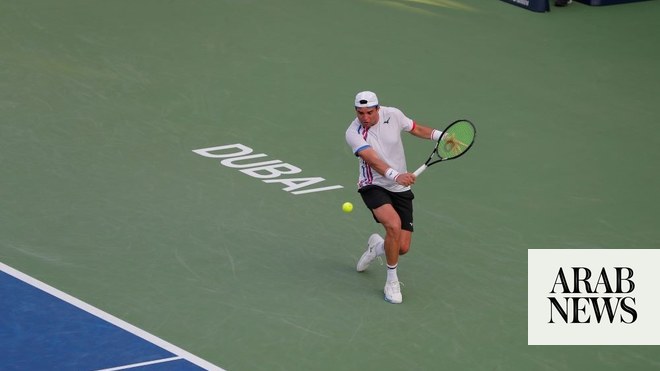
Ali Al Habsi remains the only player from the Gulf to have successful career in Europe
His excellence between the posts would quickly become apparent in the three years he spent in Norway
DUBAI: The list of greatest players to come out of the Gulf will always have Ali Al Habsi near the top. But the list of greatest GCC players to have a successful career in Europe has only one name on it.
The Omani goalkeeping legend on Friday night announced in Arabic and English tweets that, at the age of 38, he is finally hanging up his gloves.
“After years in which I had the honor to represent a number of clubs , today I announce the end of my career as a football player,” he posted. “I express my sincere thanks to everyone who has supported me throughout my career, confirming my continued service to my country from other locations.”
The news brings to a close a career that has spanned 22 years, nine clubs and four countries. Perhaps more importantly, it was journey that would see him become captain of Oman, a national hero and role model for footballers across the Arab world.
Few would have predicted when he started his career at his hometown club of Al Mudhaibi as a 17-year-old, that he would become the first and only player off these shores to win an FA Cup medal. But before that, he had to prove himself by taking a path never traveled before.
Nothing was handed on a plate to Al Habsi. Yet his athleticism and skill marked him out as special talent. Crucially, he had ambition and attitude unmatched by his peers.
In 2002, the 1.94m tall Al Habsi moved from Al Mudhaibi to Salalah-based Al Nasr, but after a season in which he did not make the grade, decided to take a chance on playing in Europe after being spotted by former goalkeeper John Burridge.
Lyn Oslo was to be his first stop.
While other talented footballers in the GCC have consistently eschewed challenges abroad, Al Habsi dove head first straight into an environment that could not have been more different to the one he was brought up in. Language, culture, weather, food and a different style of football and training; this was a new world for the young Omani.
His excellence between the posts would quickly become apparent in the three years he spent in Norway, and in his second season, 2003-04, he played in the Norwegian Cup final, losing, where Lyn Oslo lost 4-1 to SK Brann. Despite the loss, he was named Norway’s best goalkeeper in that year.
His performances brought him to the attention of Sam Allardyce of Bolton Wanderers, at the time flying high in the English Premier League, and he made the move to England in 2006 January transfer window. With Finland’s Jussi Jääskeläinen excelling in goal for Bolton, who had finished sixth the previous season, Al Habsi had to bide his team for the chance to show what he was made off. Once his full debut came at the start of the 2007-08, more sporadic appearances followed, mostly in cup competitions, including one against Bayern Munich in the UEFA Cup.
At that point Al Habsi was already established as his country’s number one, but had to endure heartbreak in the 2004 and 2007 Gulf Cups, losing to host nations Qatar and UAE in both finals respectively.
Redemption would come two years later, Al Habsi performing heroically as Oman hosted, and won, the 2009 Gulf Cup. He would not concede a single goal throughout the tournament as Oman drew 0-0 with Kuwait, thrashed Iraq 4-0, and overcame Bahrain 2-0 in their three group matches. In the semi-finals, Oman edged Qatar 1-0 before beating Saudi Arabia 6-5 on penalties after a 0-0 draw at the final whistle in a heaving Sultan Qaboos Sports Complex in Muscat.
Al Habsi did not have to make a save in the penalty shootout, as Saudi’s Taisir Al Jassam missed the target with the first of the sudden death penalties. Seconds later, Mohammed Rabia struck his penalty into the roof of the net and Oman had won their first ever Gulf Cup in front of a hysterical home crowd.
At Bolton, however, he was still second choice to Jääskeläinen, and typically, Al Habsi was keen to challenge himself more.
Having spent the 2010-11 season on loan at Wigan, where he was named the club’s player of the season, Al Habsi made the move a permanent one that summer and would go on to enjoy some of the best years of his career in the north of England, playing 102 League matches for Wigan in five seasons.
In 2012-13, Wigan were relegated from the Premier League, but remarkably beat the previous season’s champions Manchester City 1-0 in the FA Cup final. That afternoon at Wembley, Al Habsi was on the bench, but his winners medal made him the first player from the Gulf to win the world’s oldest competition.
With Oman too, his career was hitting its peak, his face beaming on billboards, television commercials and magazine covers.
A famous 2-1 win against Jordan in Muscat on Oct. 12, 2012 raised the astonishing possibility of Oman reaching the 2014 World Cup in Brazil, but sadly Paul Le Guen’s men would fall short of a play-off spot in the fourth qualifying round.
After a loan spell at Brighton, Al Habsi spent two personally successful seasons at Reading, where he was named the club’s player of the season twice. The summer of 2017 looked to have brought his time in England to a close as Saudi giants Al Hilal came calling.
In his two years in Riyadh, Al Habsi would finally add the regional silverware missing from his collection, winning the Saudi Professional League in his first season and then adding the 2018 Saudi Super Cup as Al Hilal beat Al Ittihad at QPR’s Loftus Road ground in London.
The interrupted 2019-20 season would see one final swansong for Al Habsi in his now adopted second home of England with West Bromwich Albion in the Championship, the veteran keeper acting as third choice behind Sam Johnstone and Jonathan Bond as Slaven Bilic’s men secured promotion to the Premier League.
As ever in his remarkable career, Al Habsi has made the right decision to call it a day. On social media, tributes for a beloved legend poured in from the Gulf, the Middle East and Europe, including his old team Wigan Athletic.
A true pioneer, Al Habsi leaves an unmatched legacy in the GCC, winning the best goalkeeper award at the Gulf Cup in 2003, 2004, 2007, 2009 and 2011.
His beaming smile, leadership and spectacular goalkeeping will be missed.












